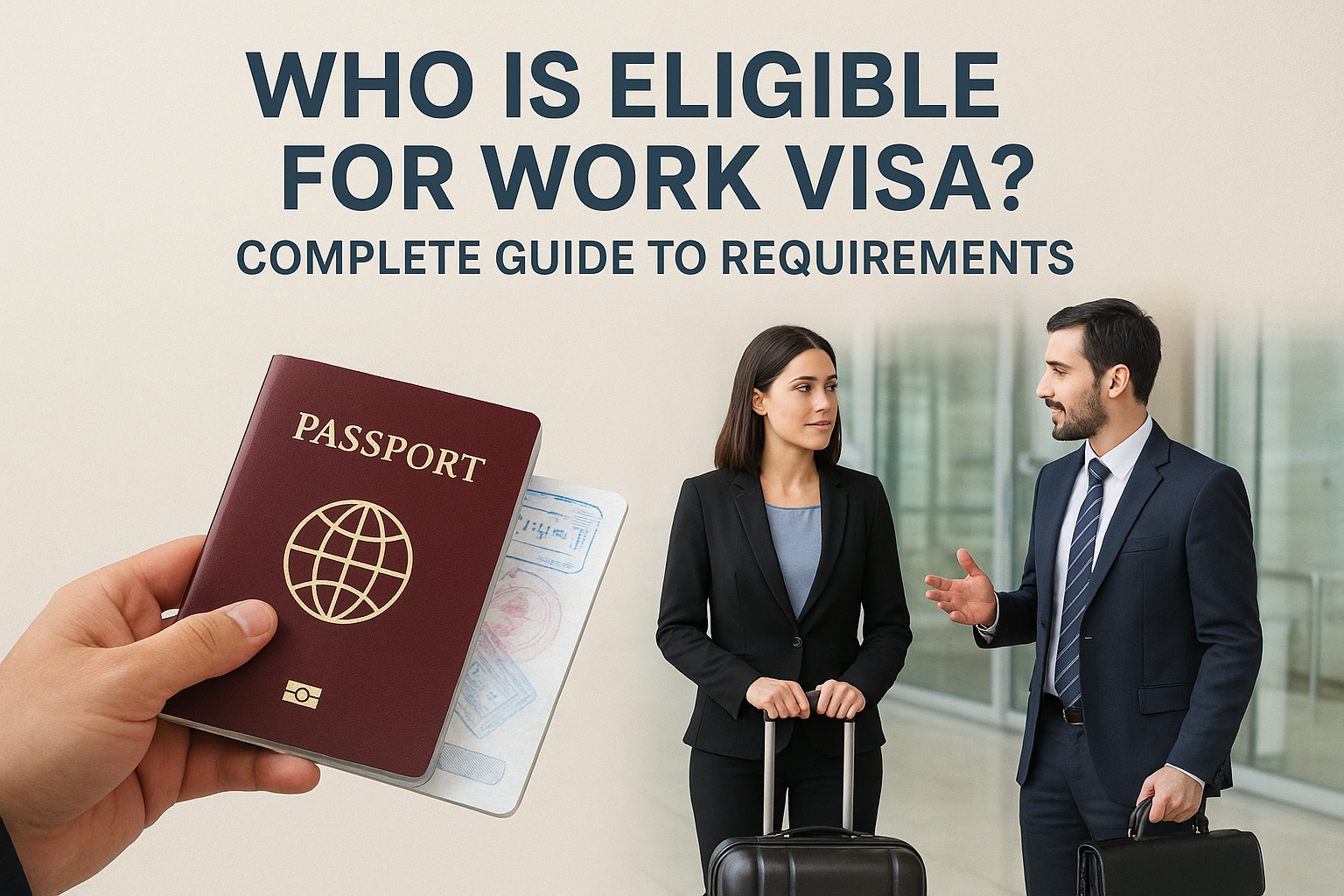Dreaming of working abroad but unsure if you qualify? Understanding who is eligible for work visa applications can feel overwhelming with different countries having varied requirements, documentation processes, and qualification standards. Whether you’re a skilled professional, recent graduate, or experienced worker looking to expand your career internationally, navigating work visa eligibility criteria is the crucial first step toward your global career aspirations.
The good news is that most developed countries actively seek talented international workers to fill skill gaps in their economies. However, each destination has specific eligibility requirements that determine whether your application will be successful. From educational qualifications and work experience to language proficiency and financial stability, multiple factors influence your work visa eligibility across different nations.
Understanding Work Visa Categories and Basic Eligibility
Temporary vs. Permanent Work Authorization
Work visas generally fall into two main categories: temporary work permits and permanent residence pathways. Temporary work visas typically require employer sponsorship and allow you to work for a specific company for a limited duration, usually 1-3 years with renewal possibilities. Permanent work visas, on the other hand, often follow points-based systems that evaluate your skills, education, and experience independently of employer sponsorship.
Most countries design their work visa systems to address labor market needs, meaning individuals eligible for work visa programs often possess skills in high-demand sectors like healthcare, technology, engineering, and skilled trades.
Skills-Based Immigration Systems
Many countries, including Canada, Australia, and New Zealand, operate points-based immigration systems that assess candidates based on factors like age, education, work experience, language proficiency, and job offers. These systems make it easier to determine if you’re eligible for work visa applications before investing time and money in the process.
Educational Requirements for Work Visa Eligibility
Minimum Education Standards
Most work visa programs require applicants to have completed at least secondary education, though many prefer post-secondary qualifications. A bachelor’s degree is often the minimum requirement for skilled worker categories, while advanced degrees can significantly boost your application strength.
Educational credentials must typically be evaluated by recognized agencies to ensure they meet the destination country’s standards. This process, called credential assessment or recognition, verifies that your foreign education is equivalent to local educational standards.
Professional Certifications and Licensing
Certain professions require additional licensing or certification beyond educational qualifications. Healthcare workers, engineers, teachers, and legal professionals often must complete additional examinations or certification processes to be eligible for work visa programs in regulated industries.
These professional requirements vary significantly between countries, so research specific licensing requirements for your profession in your target destination early in your planning process.
Work Experience and Skills Assessment
Required Years of Experience
Most skilled work visa categories require a minimum of 2-5 years of relevant work experience in your field. This experience should be recent, typically within the last 10 years, and closely related to your intended occupation abroad.
The quality and level of your work experience matter as much as duration. Senior positions, management experience, and specialized skills often carry more weight in visa assessments than entry-level roles.
Skills Assessment Process
Many countries require formal skills assessments conducted by designated professional bodies or government agencies. These assessments evaluate whether your work experience and qualifications match the standards expected for your occupation in the destination country.
Skills assessments can take several months to complete and often require detailed documentation of your work history, including job descriptions, employment letters, and sometimes portfolio submissions or practical demonstrations of your abilities.
Language Proficiency Requirements
English Language Testing
Countries like the United States, United Kingdom, Canada, Australia, and New Zealand typically require proof of English proficiency through standardized tests like IELTS, TOEFL, or PTE. Minimum score requirements vary by visa category and destination, but generally range from intermediate to advanced levels.
Some professions, particularly those involving public safety or direct client interaction, may have higher language requirements than general skilled worker categories.
Other Language Requirements
Non-English speaking destinations may require proficiency in their local languages. For example, working in Germany often requires German language skills, while France may require French proficiency depending on the job type and visa category.
Country-Specific Eligibility Requirements
United States Work Visa Eligibility
The US offers several work visa categories, each with distinct eligibility criteria. H-1B visas for specialty occupations typically require a bachelor’s degree and employer sponsorship. L-1 visas for intracompany transfers require at least one year of employment with a multinational company. O-1 visas for individuals with extraordinary abilities require extensive documentation of achievements and recognition in your field.
Being eligible for work visa programs in the US often depends on having an employer willing to sponsor your application and demonstrate that no qualified US workers are available for the position.
Canadian Work Permit Requirements
Canada’s work visa system includes both employer-specific work permits and open work permits. The Federal Skilled Worker Program evaluates candidates based on factors including age, education, work experience, language abilities, arranged employment, and adaptability factors.
Express Entry system candidates must meet minimum requirements in education, work experience, and language proficiency to be eligible for work visa consideration through this popular immigration pathway.
United Kingdom Work Visa Standards
The UK’s points-based immigration system requires candidates to score at least 70 points across various categories including job offer, skill level, English language proficiency, and salary threshold. Most applicants need a job offer from a UK employer with a valid sponsor license.
Recent changes to UK immigration rules have made it easier for skilled workers to qualify, particularly in shortage occupations like healthcare, engineering, and information technology.
Australian Immigration Requirements
Australia’s skilled migration program operates through a points-tested system evaluating age, English proficiency, skilled work experience, educational qualifications, and other factors. Applicants must score at least 65 points to be eligible for work visa submission, though higher scores improve selection chances.
Many Australian states also offer nomination programs that can provide additional points and pathways for skilled workers willing to live and work in specific regions.
Age Limitations and Demographic Factors
Age Restrictions Across Different Programs
Most countries impose age limits on their skilled worker programs, typically favoring candidates between 25-45 years old. Australia’s points system, for example, awards maximum points to applicants aged 25-32, with points decreasing for older applicants.
However, age restrictions vary by program type and some categories, like investor visas or employer-specific permits, may have more flexible age requirements.
Family Considerations
Many work visa programs allow successful applicants to include immediate family members (spouse and dependent children) in their applications. However, having a larger family can sometimes affect eligibility, particularly for programs with financial support requirements or in countries with limited healthcare and education resources.
Financial Requirements and Economic Factors
Proof of Financial Support
Most countries require work visa applicants to demonstrate sufficient financial resources to support themselves and their families during the initial settlement period. These requirements vary significantly, ranging from a few thousand dollars to substantial amounts depending on family size and destination.
Some programs require bank statements, investment portfolios, or employment contracts showing guaranteed income to prove financial stability.
Investment and Business Visa Options
For entrepreneurs and investors, many countries offer specific visa categories that require substantial financial investment in local businesses or economy. These programs often have different eligibility criteria focused on business experience, investment amounts, and job creation potential rather than traditional employment qualifications.
Health and Character Requirements
Medical Examinations
All countries require work visa applicants to undergo medical examinations by approved panel physicians to ensure they don’t pose public health risks and won’t burden local healthcare systems. Some countries have specific health requirements for certain occupations, particularly healthcare workers and food handlers.
Police Clearance and Background Checks
Criminal background checks from all countries where you’ve lived for extended periods are typically required. Most countries will refuse visa applications from individuals with serious criminal records, though minor infractions may not automatically disqualify applicants.
Application Process and Timeline Considerations
Documentation Preparation
Being eligible for work visa programs is only the first step—successful applications require meticulous documentation preparation. This includes educational transcripts, work experience letters, language test results, medical examinations, police clearances, and various forms and declarations.
Start gathering documents early, as obtaining some certificates and clearances can take several months. Many documents also have validity periods, so timing your application submission is crucial.
Processing Times and Planning
Work visa processing times vary dramatically by country, visa type, and current application volumes. Some programs process applications within weeks, while others may take months or even years. Plan your career transition timeline accordingly and consider applying for multiple programs simultaneously if eligible.
Common Mistakes and How to Avoid Them
Documentation Errors
Incomplete or incorrect documentation is the leading cause of work visa application delays and refusals. Double-check all forms, ensure translations are certified where required, and verify that all supporting documents meet specific format and content requirements.
Misunderstanding Eligibility Criteria
Many applicants assume they’re eligible for work visa programs without thoroughly researching requirements. Each program has specific criteria, and meeting minimum requirements doesn’t guarantee selection, particularly for competitive programs with limited places.
Future Trends and Emerging Opportunities
Skills Shortages and Growing Demand
Global skills shortages in technology, healthcare, engineering, and skilled trades are creating new opportunities for international workers. Many countries are expanding their work visa programs and reducing barriers for in-demand occupations.
Post-pandemic economic recovery has also increased demand for skilled workers in many sectors, potentially making it easier for qualified candidates to find employer sponsorship and meet work visa requirements.
Remote Work and Digital Nomad Visas
The rise of remote work has led to new visa categories designed for digital nomads and remote workers. These programs often have different eligibility criteria focused on income levels and remote work capabilities rather than traditional employer sponsorship requirements.
Conclusion
Understanding who is eligible for work visa programs requires careful research and honest assessment of your qualifications against specific country requirements. While each destination has unique criteria, most successful applicants share common characteristics: relevant education, skilled work experience, language proficiency, and the financial resources to support their transition.
The key to work visa success lies in thorough preparation, accurate self-assessment, and strategic planning. Start by evaluating your qualifications against multiple countries’ requirements, then focus your efforts on the programs where you’re most competitive. Remember that being eligible for work visa applications is just the beginning—presenting a strong, well-documented application is what transforms eligibility into success.
Ready to take the next step in your international career journey? Start by assessing your qualifications today and share your experiences or questions in the comments below to help others navigate their work visa journey.

